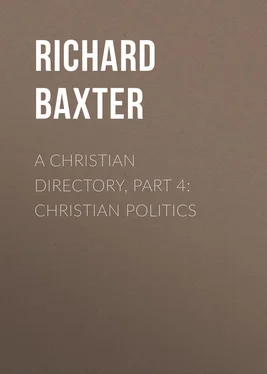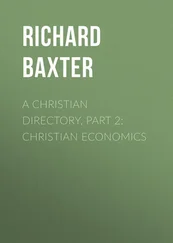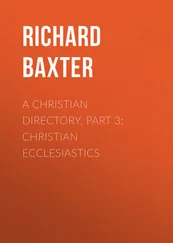Richard Baxter - A Christian Directory, Part 4 - Christian Politics
Здесь есть возможность читать онлайн «Richard Baxter - A Christian Directory, Part 4 - Christian Politics» — ознакомительный отрывок электронной книги совершенно бесплатно, а после прочтения отрывка купить полную версию. В некоторых случаях можно слушать аудио, скачать через торрент в формате fb2 и присутствует краткое содержание. Жанр: foreign_antique, foreign_prose, на английском языке. Описание произведения, (предисловие) а так же отзывы посетителей доступны на портале библиотеки ЛибКат.
- Название:A Christian Directory, Part 4: Christian Politics
- Автор:
- Жанр:
- Год:неизвестен
- ISBN:нет данных
- Рейтинг книги:3 / 5. Голосов: 1
-
Избранное:Добавить в избранное
- Отзывы:
-
Ваша оценка:
- 60
- 1
- 2
- 3
- 4
- 5
A Christian Directory, Part 4: Christian Politics: краткое содержание, описание и аннотация
Предлагаем к чтению аннотацию, описание, краткое содержание или предисловие (зависит от того, что написал сам автор книги «A Christian Directory, Part 4: Christian Politics»). Если вы не нашли необходимую информацию о книге — напишите в комментариях, мы постараемся отыскать её.
A Christian Directory, Part 4: Christian Politics — читать онлайн ознакомительный отрывок
Ниже представлен текст книги, разбитый по страницам. Система сохранения места последней прочитанной страницы, позволяет с удобством читать онлайн бесплатно книгу «A Christian Directory, Part 4: Christian Politics», без необходимости каждый раз заново искать на чём Вы остановились. Поставьте закладку, и сможете в любой момент перейти на страницу, на которой закончили чтение.
Интервал:
Закладка:
Consid. XX. Lastly, set before you the example of our Lord Jesus Christ: see whether he was addicted to wrath and malice, hurtfulness or revenge. If you will not imitate him, you are none of his disciples; nor will he be your Saviour. A serious view of the holy pattern of love, and meekness, and patience, and forgiveness, which is set before us in the life of Christ, is a most powerful remedy against malice and revenge; and will cure it, if any thing will cure it. Phil. ii. 5-7, "Let this mind be in you, which was also in Christ Jesus, who being in the form of God, – yet made himself of no reputation, and took upon him the form of a servant." 1 Pet. iv. 1, "Forasmuch then as Christ hath suffered in the flesh, arm yourselves likewise with the same mind." 1 Pet. ii. 19-25, "For this is thankworthy, if a man for conscience toward God, endure grief, suffering wrongfully; for what glory is it if when ye be buffeted for your faults, ye shall take it patiently: but if when ye do well and suffer for it, ye take it patiently, this is acceptable with God. For even hereunto were ye called; because Christ also suffered for us, leaving us an ensample that ye should follow in his steps; who did no sin, neither was guile found in his mouth; who when he was reviled, reviled not again; when he suffered, he threatened not, but committed it to him that judgeth righteously." Think not to live and reign with Christ, if you will not follow him, and suffer with him. It is impudent presumption, and not faith, to look to be like the saints in glory, while you are like the devil in malice and cruelty.
CHAPTER X.
CASES RESOLVED ABOUT FORGIVING INJURIES AND DEBTS, AND ABOUT SELF-DEFENCE, AND SEEKING RIGHT BY LAW OR OTHERWISE
The cases about forgiving, and revenging, are many, and some of them difficult: I shall resolve those of ordinary use in our practice, and pass by the rest.
Quest. I. Is a man bound to forgive all injuries and damages that are done him? If not, what injuries be they which every man is obliged to forgive?
Answ. To both these questions I briefly answer, 1. We must distinguish between a crime or sin against God, and the common good; and an injury or damage to ourselves. 2. And between public justice and private revenge. 3. And between those damages which fall upon myself only, and those that by me redound to others, (as wife or children, &c.) 4. And between the remitting of a punishment, and the remitting of reparations of my loss. 5. And between the various punishments to be remitted. He that will confound any of these shall sooner deceive himself and others, than resolve the doubts.
Prop. I. It frequently falleth out, that it is not in our power to remit the penalty of a crime; no, not the temporal penalty. For this is a wrong to God the universal Governor, and God only can forgive it, and man no further than God hath commissioned him. Murder, whoredom, drunkenness, swearing, &c. as they are sins against God, the magistrate is bound to punish, and private men to endeavour it by the magistrate. And if it may be said, that the sovereign ruler of a nation hath power to forgive such crimes, the meaning is no more than this: 1. That as to the species of these sins, if he do forgive the temporal punishment which in his office he should have inflicted, yet no human power can question him for it, because he hath none on earth above him; but yet God will question him, and show him that he had no power to dispense with his laws, nor disoblige himself from his duty. 2. And that in some cases an individual crime may be forgiven by the magistrate as to the temporal punishment, even where the ends of the law and government require it; but this must not be ordinary.
Prop. II. It is not always in the power of the magistrate to remit the temporal punishment of heinous crimes, against the common good. Because it is ordinarily necessary to the common good that they be punished; and his power is for the common good, and not against it. The enemies of the public peace must by punishment be restrained.
Prop. III. Much less is it in the power of a private man to remit a penalty to be inflicted by a magistrate. And what I say of magistrates, holdeth of parents, and other governors, cæteris paribus , according to the proportion of their authority.
Prop. IV. I may by just means exact satisfaction for damages to myself, in my reputation or estate, when the ends of christianity, even the honour of God, and the public good, and the benefit of men's souls, require it; that is, when I only vindicate these by lawful means, as they are the talents which God hath committed to me for his service, and for which he will call me to account. It may fall out that the vindicating of a minister's or other christian's name from a slander, may become very needful for the interest and honour of religion, and for the good of many souls. And if I have an estate which I resolve to use for God, and a thief or a deceiver take it from me, who will do no good with it but hurt, I may be bound to vindicate it; that I may be enabled to do good, and may give God a comfortable account of my stewardship; besides the suppressing of thievery and deceit, as they are against the common good.
Prop. V. When my estate is not entirely my own, but wife or child or any other is a sharer in it, it is not wholly in my power to remit any debt or damage out of it, but I must have the consent of them that are joint-owners; unless I be intrusted for them.
Prop. VI. If I be primarily obliged to maintain wife and children, or any others, with my estate, I am bound on their behalf to use all just means to vindicate it from any that shall injuriously invade it; otherwise I am guilty of their sufferings whom I should maintain; I may no more suffer a thief than a dog to go away with my children's meat.
Prop. VII. And as I must vindicate my estate for others to whom I am intrusted to administer it by God, so must I for myself also, so far as God would have me use it myself. For he that hath charged me to provide for my family, requireth also that I famish not myself; and he hath required me to love my neighbour but as myself; and therefore as I am bound to vindicate and help my neighbour if a thief or oppressor would rob him, (according to my place and power,) so must I do also for myself. In all these seven cases I am not obliged to forgive.
But on the other side, in all these cases following, I am bound to forgive and let go my right.
Prop. I. As the church may declare to penitent sinners, the remission of the eternal punishment, so may it remit the temporal punishment of excommunication, to the penitent; yea, this they are obliged by Christ to do, ministerially, as under him.
Prop. II. When the repentance and satisfaction of the sinner is like to conduce more to the public good, and the honour of God, and other ends of government, than his punishment would do, a private man may not be obliged to prosecute him before the magistrate, and the magistrate hath power to forgive him as to the penalty which it belongeth to him to inflict. (Though this may not extend to the remitting of crimes ordinarily and frequently, nor to the remitting of some sort of heinous crimes at all; because this cannot attain the ends of government as aforesaid.)
Prop. III. All personal wrongs, so far as they are merely against myself, and disable me not from my duty to God and my neighbour, I may and must forgive: for my own interest is put more in my own power; and here it is that I am commanded to forgive. If you say that I am bound to preserve my own life and soul as much as another's; I answer, it is true, I am bound to preserve my own and another's ultimately for the service and glory of God; and God's interest in me I cannot remit or give away. As there is no obligation to duty but what is originally from God, so there is none but what is ultimately for God, even to please and glorify him.
Читать дальшеИнтервал:
Закладка:
Похожие книги на «A Christian Directory, Part 4: Christian Politics»
Представляем Вашему вниманию похожие книги на «A Christian Directory, Part 4: Christian Politics» списком для выбора. Мы отобрали схожую по названию и смыслу литературу в надежде предоставить читателям больше вариантов отыскать новые, интересные, ещё непрочитанные произведения.
Обсуждение, отзывы о книге «A Christian Directory, Part 4: Christian Politics» и просто собственные мнения читателей. Оставьте ваши комментарии, напишите, что Вы думаете о произведении, его смысле или главных героях. Укажите что конкретно понравилось, а что нет, и почему Вы так считаете.












